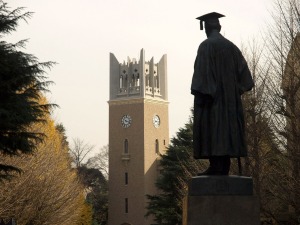Prestigious Private Universities (Kanto)/早慶上理マーチ
Top private universities in the Kanto area:
Keio has a proud history as Japan’s very first private institution of higher learning, which dates back to the formation of a school for Dutch studies in 1858 in Edo (now Tokyo) by founder Yukichi Fukuzawa. Since the school’s inception, the students of Keio have risen to the forefront of innovation in every imaginable academic field, emerging as social and economic leaders.
In today’s internationally interdependent world, Keio places great effort upon maintaining the finest teaching faculty and superlative facilities. Prospecting from the knowledge and experience of their predecessors, today’s Keio students strive to develop the leadership qualities that will enable them to make valuable contributions to tomorrow’s society. In 2008 the University will celebrate its sesquicentennial (150th) anniversary.
Waseda University was founded in 1882 by Shigenobu Okuma, later Prime Minister of Japan, on the three pillars of independence of learning, utilization of knowledge, and the creation of good citizenship, with the overarching aim to cultivate leaders in Japan. Over the years it has stayed true to these founding principles, educating six prime ministers and the heads of major corporations, and countless other business leaders, politicians, journalists, diplomats, scholars, scientists, inventors, actors and writers. Originally a college, Waseda today is a comprehensive research university with thirteen undergraduate and twenty-four graduate schools, multiple centers, institutes, and affiliated institutions, widely acclaimed as one of Japans top universities.
Sophia University (Jochi Daigaku) was founded by the Jesuits in 1913. It began with the mission to build bridges between Japan and the world, and has been a pioneer in international education in Japan, attracting faculty and students from all over the world. In 1949 Sophia established the first program in Japan taught entirely in English, and it continues to lead the Japanese academic world in offering international programs. The University is located in Yotsuya, literally in the heart of Tokyo. The area around the university has long been at the center of the Japanese political, economic and cultural worlds. Sophia’s graduates pursue careers in international organizations, in major Japanese and international corporations, in the research labs of companies and universities in Japan and abroad, in teaching, in law and politics, and in numerous non-governmental and non-profit organizations. Reflecting our international orientation, there are Sophia alumni associations in all of the major cities of the world.
– Tokyo University of Science(東京理科大学)
Ever since its predecessor was established in 1881 by 21 young physicists, the Tokyo University of Science (Tokyo Rika Daigaku) has continually pursued the lofty ideal of contributing to Japan’s development through the pursuit and dissemination of scientific knowledge. As a science-oriented university, we have endeavored to meet the needs of society and the times by adopting new educational approaches and undertaking research in today’s most vital fields. TUS has developed into one of Japan’s most progressive universities in meeting the needs of today’s internationalized, information-oriented society. Through our unique education and research programs, we will continue to strive for the betterment of society.
Meiji University has expanded to become one of the most prominent private universities in Japan, and it is celebrating its 130th anniversary in 2011. With Rights, Liberty, Independence and Self-Government as its guiding principles, we are committed to fostering students who satisfy the “needs of the times.” Sending out more than 470,000 graduates into the world to date, we have already made a great contribution to society.
– Aoyama Gakuin University(青山学院大学)
Aoyama Gakuin University (AGU) is part of a comprehensive educational institute called Aoyama Gakuin, which includes kindergarten, elementary school, junior/senior high school, and women’s junior college. At each level, Aoyama Gakuin offers people quality education that is based on our solid academic foundation, which has been continuously enhanced throughout our unique history.
When Rikkyo University was founded, Japan’s primary goal was to catch up with the advanced Western nations and become materially affluent. Education was also influenced by this materialistic ideology. There was a strong trend towards providing a utilitarian education, using knowledge and technology as tools to gain material wealth and get ahead in the world. Rikkyo University was founded as a clear departure from this trend. The university was conceived not simply as a place for students to acquire knowledge, but rather as a place where they could seek the truth in order to step into an unknown world. The university formulated a policy of nurturing students who have the ability to not only unravel the unknown, but to seek out the meaning of the mysteries revealed and make use of the answers to benefit human society.
Chuo University was founded as Igirisu Horitsu Gakko (the English Law School) in 1885 through efforts led by a group of 18 young attorneys. In the opinion of these young attorneys, studying British law, which was closely intertwined with the social reality, would be useful in establishing a judicial system in Japan and achieving?modernization. Their vision was to nurture human resources that would be ideally suited to modern society through education at Igirisu Horitsu Gakko.
Hosei University began as a private school (Tokyo Hougakusha) in 1880 against the backdrop of a growing movement for individual freedom and human rights. The School was established to educate individuals in the concepts of rights and obligations and contemporary French juridical thought. From the initial ideals of A Free Academic Society and a Climate of Initiative, i.e. the introduction of liberal progressive education and research development befitting the forming of a modern Japanese society, came the founding principles of Freedom and Progress. At present Hosei is a comprehensive university with 16 undergraduate faculties, a School of Correspondence Education, 14 graduate schools, 1 institute, and 2 professional schools.








